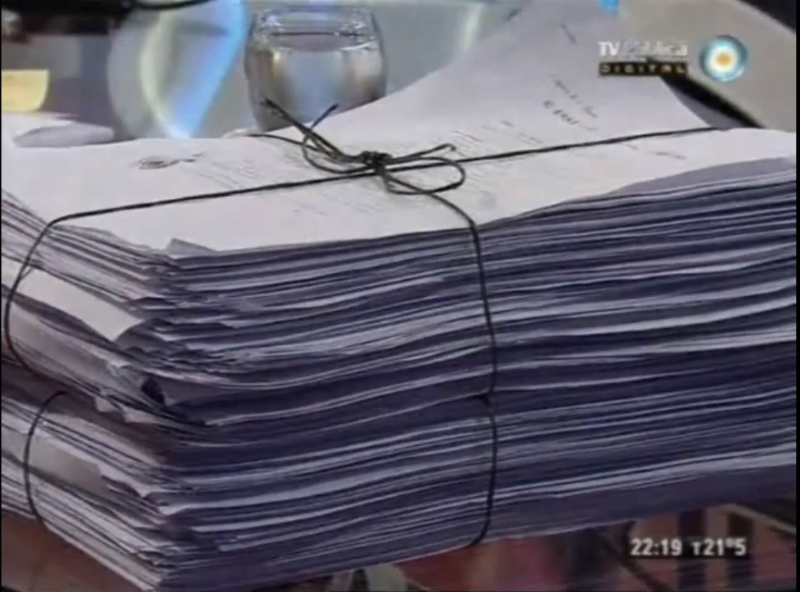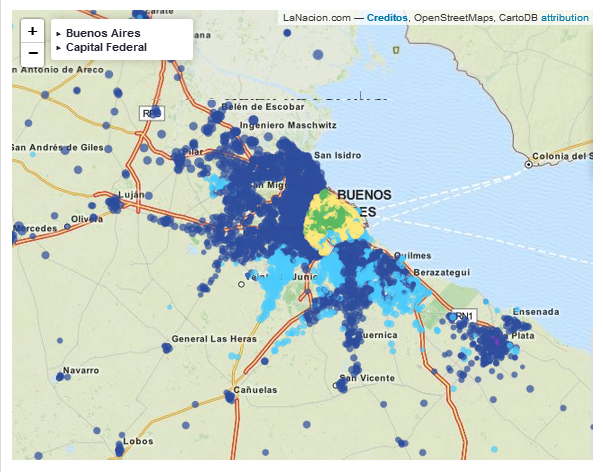LA NACION has an integral strategy. More than 17,000,000 UBs in it´s news website, 2,230,555 followers between it´s Twitter channels, 1,070.487 followers between all the newsroom staff Twitter accounts and 2,667,683 fans in total between all of it´s Facebook pages.
Argentina, still has no FOIA and needs to open data and help citizens deal with this so as to empower them. That´s why the past year we continued to grow our commitment with open and data journalism, introducing open collaboration.
Open data journalism, collaboration and data storytelling using free or reusable tools were our way, not only to lead in quality journalism but to envision a long term strategy that can help sustain or reinvent journalism and media even in a hostile political context.
We increased our data storytelling by using free reusable tools like Timeline.js, Storymap.js , Tableau, Tabula, DocumentCloud, CartoDB, Open Refine and Google collaboration tools and by setting our reusable graphs in javascript and special interactive visualizations for the Elections.
Our data driven investigations are being presented in judicial cases or amplified by national TV or radios; and our news applications have become a new bridge to integrate NGOs and academia using collaboration as a new form of intelligence.
We continued activating the data community via hacktivism, participating in hackathons, sharing open source code in Github, and organizing our own DATAFEST event.
We learn and train, and in may 2014 we gave our fourth Data Journalism internal training. Even though we are a small team, we trained on Ruby, D3, CartoDB, Tableau, ArcGis, Open Refine and Excel for DATA.
We algo give workshops on Social and Mobile journalism and keep a pool of smartphones to lend as mobile equipment for journalists who do real time multimedia reporting.
In terms of internal communications we keep track of our newsroom´s reporting initiatives in a special blog and share them internally, and we have our own “LA NACION Multimedia and Data journalism Awards”.
We believe in openness to serve our audience using Social, Mobile and Data Journalism, mixing social with BI with journalism, engaging hacktivism with industry experts and NGOs, and leading a movement that collaborates and opens data, which together with journalism will leverage digital media as a new tool to empower citizens towards innovation, participation and knowledge discovery.
Three examples of user interface and innovative interactivity:
– Data as context integrated as content TAGs: to enrich stories, lanacion.com adapted it´s CMS to integrate data. Every news application or data platform we develop must be structured with this in mind so data can be distributed in topical or persons tags. This helps users understand and dig deeper into stories and backgrounds.
– Open statements of assets from Argentina´s public officials: together with three transparency NGO´s, we developed the first site concerning the heritage of public servants. This news application allows users to visualize a large volume of information, to search and do comparisons, and it also has an easy visual interface, which includes the possibility to explore every original PDF document in detail, using DocumentCloud. It has helped users because before this they had to go to the Anticorruption office for information. Now data is downloadable in open data formats.
– Junar Open Data Platform: In our “Data Dashboard , LA NACION hosts the datasets that we open and share. We integrated this platform that helps our readers download data, embed datastreams or share them in social media.The platform has an API so any user can download this data in a single action.
On creative use of online technology last months we started using:
Examples provided are updated from datastreams manually by our journalists. Users can download them in open data formats like XML, CSV and JSON.
– CartoDB: we developed an exclusive interactive map that allowed visualization of the results of the 2013 parliamentary election in the different voting centers Buenos Aires. The map combined three layers of data: the geo-localization of voting centers, the number of votes and the distribution of those votes by party in each center.
– Vozdata: our open collaborative platform to transform public PDF documents into structured data. Using Documentcloud,and reusing an idea of Guardian and Propublica with help of our Opennews fellows we developed a platform that served to activate a community of more than 500 volunteers for our first 6,700 Senate Expenses project fulfilled in two months after organizing two “civic marathons” in LA NACION.
This platform was open sourced.
Social tools strategy: La Nacion has an active focus on the use of social tools for reaching and including the audience in their work . More than 35 branded official channels with more than 2MM followers, 130 journalists on Twitter, a 35 blog network, which has thriving communities that daily participate in the content of each blog by posting their comments (for example, in Movies, Amateur Cooking and Gay Friendly blogs). Many of these also have a very active Facebook Fan page participation (Cooking and Gardening for instance).We work with our audience on Facebook, generating specific content on the various pages of lanacioncom (with more than 913 995 fans), canchallenacom (our sports site),sections Fashion/Beauty and Culture, and fanpages of some of our blogs.
We’ve also started with Instagram initiatives for different channels and magazines.
Third parties support include awards, special funding and/or praise from Tow Center at Columbia University, ONA International, Tableau Software Inc., The Knight Foundation, The Knight-Mozilla OpenNews program, GEN, International Journalism Festival, Open Government Partnership, ICFJ, EJC, Journalism.co.uk, Regional Conference on Open Data for Latinamerica, US Embassy in Argentina
Original reporting:




















